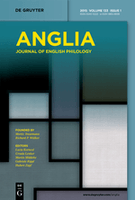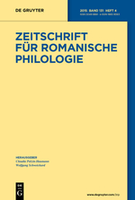
Filologicheskie Nauki-Nauchnye Doklady Vysshei Shkoly-Philological Sciences-Scientific Essays of Higher Education
metrics 2024
Exploring Linguistic Frontiers in Higher Education
Introduction
Filologicheskie Nauki-Nauchnye Doklady Vysshei Shkoly-Philological Sciences-Scientific Essays of Higher Education, with ISSN 2310-4287, is a distinguished academic journal published by INOIT ALMAVEST that focuses on the diverse field of philology, linguistics, and literary studies. Based in Moscow, Russia, this journal aims to disseminate innovative research findings and scholarly discussions that contribute to the advancement of philological scholarship. Although specific metrics such as impact factor and H-Index are currently unavailable, the journal is committed to maintaining high scholarly standards and fostering dialogue among academics, practitioners, and students. As a platform for peer-reviewed articles, it serves as an essential resource for those seeking to deepen their understanding of linguistic theory, literature analysis, and language education. With a robust emphasis on open-access dissemination, the journal encourages the sharing of knowledge and research insights to a global audience, thereby enhancing the visibility and accessibility of philological research.
Metrics 2024
 -
- 0.10
0.10 0.10
0.10 -
-Metrics History
Rank 2024
JCI (Web Of Science)
Quartile History
Similar Journals

Anuari de Filologia-Llengues i Literaturas Modernas
Unveiling new perspectives in modern languages and literatures.Anuari de Filologia-Llengues i Literaturas Modernas is a distinguished academic journal published by the Universitat de Barcelona, specifically the Facultad de Filologia. This journal focuses on the fields of modern languages and literatures, aiming to foster scholarly dialogue and disseminate groundbreaking research in linguistics and contemporary literary studies. With its open access model established in 2011, it ensures that research findings are freely available to a wide audience, enhancing visibility and impact in the academic community. Although the journal's H-index and Scopus ranking are currently not available, its ongoing commitment to high-quality peer-reviewed scholarship plays a crucial role in advancing knowledge in the humanities. Positioned as a valuable resource for researchers, professionals, and students alike, the journal invites contributions that push the boundaries of understanding within modern philology and cultural studies.

Archivum
Bridging Academia and Open Knowledge Since 1951Archivum, published by UNIV OVIEDO in Spain, stands as a vital resource in the fields of Linguistics and Language as well as Literature and Literary Theory. With an impact factor reflective of its commitment to scholarly excellence, this journal has proudly maintained an Open Access model since 1951, ensuring that its rich repository of knowledge is freely available to researchers, professionals, and students alike. Covering a converged span from 2019 to 2023, Archivum has strategically positioned itself within the academic milieu, currently categorized in the Q4 for Linguistics and Language and Q3 for Literature and Literary Theory as of 2023. The journal is indexed in Scopus, with rankings that reflect its growing influence, such as #690 in Literature and Literary Theory and #887 in Language and Linguistics. Despite its challenges in visibility, Archivum remains essential for those seeking to engage with contemporary discussions and research within the humanities. Located in the heart of Asturias, it embodies the scholarly spirit of Spain, fostering a collaborative environment for innovation and inquiry in linguistic and literary studies.

Revista Virtual de Estudos da Linguagem-ReVEL
Connecting Scholars Through Open Access Linguistic ResearchRevista Virtual de Estudos da Linguagem-ReVEL is a prominent academic journal dedicated to the field of linguistics, published by REVISTA VIRTUAL ESTUDOS LINGUAGEM in Brazil. With its ISSN 1678-8931, ReVEL aims to provide a platform for scholarly communication and dissemination of research across diverse areas of language studies, including sociolinguistics, language acquisition, and discourse analysis. As an open-access journal, it fosters accessibility to important linguistic research, allowing researchers, educators, and students alike to engage with the latest findings without subscription barriers. The journal’s focus on innovative methodologies and interdisciplinary approaches makes it a valuable resource for those seeking to deepen their understanding of language dynamics in various contexts. By contributing to the growing body of knowledge in this field, ReVEL plays a crucial role in promoting scholarly dialogue and enhancing the visibility of Brazilian linguistic research on a global scale.

Verba-Anuario Galego de Filoloxia
Nurturing Language Studies for Tomorrow's ScholarsVerba-Anuario Galego de Filoloxia is a prominent academic journal published by UNIV SANTIAGO COMPOSTELA, dedicated to advancing the field of linguistics and language studies. Hailing from Spain, this journal provides a vital platform for researchers, educators, and students interested in Galician philology and its broader linguistic implications. Although it operates under traditional access models, the journal’s commitment to quality research is reflected in its categorization within Q3 in Linguistics and Language for 2023, showcasing its significant contributions to the field. Encompassing a convergence period from 2017 to 2024, Verba garners attention in both the Arts and Humanities and Social Sciences domains, with its Scopus rankings highlighting its moderate impact within these categories. By nurturing scholarly dialogue and disseminating innovative studies, Verba-Anuario Galego de Filoloxia plays a crucial role in promoting linguistic research, making it an essential resource for professionals and academic institutions striving to explore the complexities of language and philology.

British and American Studies
Fostering Innovation in Cultural Studies and LiteratureBritish and American Studies, published by EDITURA UNIV VEST, is a pivotal open-access journal that fosters scholarly discourse in the fields of Cultural Studies, Linguistics, and Literature. Established with the aim of bridging gaps between British and American socio-cultural contexts, the journal provides a platform for researchers, professionals, and students to explore complex themes through critical analysis and innovative perspectives. With its ISSN 1224-3086 and E-ISSN 2457-7715, the journal has maintained an impressive impact factor, achieving ranking in Q2 and Q3 quartiles as of 2023 across multiple categories, positioning itself as a relevant voice in the academic community. As an open-access publication since 2015, it endeavors to ensure that research is available to a broad audience, thereby enhancing the dissemination of knowledge within the humanities. As it converges towards its future goals from 2018 to 2024, "British and American Studies" continues to invite transformative and enterprising contributions that challenge existing paradigms and fuel academic inquiry.

Jordan Journal of Modern Languages & Literature
Fostering Insightful Dialogue in the HumanitiesJordan Journal of Modern Languages & Literature is a prestigious academic journal published by Yarmouk University, Deanship of Research & Graduate Studies. This journal serves as a vital platform for scholars and researchers in the fields of linguistics and literature, offering a well-rounded examination of modern languages and literary theory. With an impressive Q2 ranking in Linguistics and Language and a Q1 distinction in Literature and Literary Theory as of 2023, it consistently features high-quality research that contributes to the advancement of knowledge in these domains. The Scopus rankings further reflect its academic rigor, placing it in the 79th percentile for Literature and Literary Theory and maintaining significant influence in related fields, making it an essential resource for researchers, professionals, and students alike. Although it does not operate under an open-access model, the journal's commitment to publishing groundbreaking studies can significantly aid in the understanding and progression of modern linguistic and literary practices. The Jordan Journal of Modern Languages & Literature continues to be an influential voice in fostering scholarly dialogue and advancing research in the humanities.

Lingue Antiche e Moderne
Connecting Cultures Through the Power of WordsLingue Antiche e Moderne is an esteemed open-access academic journal dedicated to the study of ancient and modern languages, published by UNIV STUDI UDINE. Since its inception in 2012, the journal has provided a platform for researchers, professionals, and students to disseminate groundbreaking studies and interdisciplinary research in linguistics and philology. With a commitment to accessibility, Lingue Antiche e Moderne encourages the sharing of knowledge across a global audience, ensuring that innovative ideas and historical insights are readily available to all. The journal plays a crucial role in advancing our understanding of linguistic evolution and cultural interchange, making it a vital resource for anyone interested in the dynamics of language through time. The ISSN for the journal is 2281-4841, ensuring its recognition in the academic community. Researchers and contributors are invited to engage with this vibrant discourse while enriching their own scholarly endeavors.

Linguistica e Filologia
Exploring the Intricacies of Language and Literature.Linguistica e Filologia is a prominent academic journal published by UNIV DEGLI STUDI BERGAMO that offers an Open Access platform since 2002, fostering scholarly communication in the fields of linguistics, philology, and comparative literature. With a commitment to advancing understanding in these disciplines, the journal serves as a vital resource for researchers, professionals, and students alike. Its content encompasses diverse theoretical and empirical studies, critiques, and analyses of language and literature, encouraging interdisciplinary dialogue. Hosted in the picturesque city of Bergamo, Italy, the journal aims to bridge gaps between historical and contemporary linguistic practices, enhancing the global discourse on language studies. With a focus on quality, transparency, and accessibility, Linguistica e Filologia plays a crucial role in shaping the future of linguistic scholarship and is an invaluable reference for anyone interested in the intricate relationships between language and culture.

ANGLIA-ZEITSCHRIFT FUR ENGLISCHE PHILOLOGIE
Exploring the Depths of English PhilologyANGLIA-ZEITSCHRIFT FUR ENGLISCHE PHILOLOGIE, published by WALTER DE GRUYTER GMBH, stands as a significant periodical in the fields of Linguistics and Literary Theory. With a rich publication history dating back to 1878 and ongoing contributions until 2024, this esteemed journal serves as a vital resource for researchers, professionals, and students interested in the evolution of the English language and literature. Although it does not currently offer open access, its rigorous peer-reviewed articles have secured a respectable standing, ranking Q3 in Linguistics and Language and Q2 in Literature and Literary Theory as of 2023. The journal, located in Berlin, Germany, continues to drive academic discourse and foster scholarly engagement in the intricacies of English philology, making it an essential platform for the latest research and developments in the field.

ZEITSCHRIFT FUR ROMANISCHE PHILOLOGIE
Bridging Historical Insights with Modern Literary DiscourseZEITSCHRIFT FUR ROMANISCHE PHILOLOGIE, published by Walter de Gruyter GmbH, stands as a prominent peer-reviewed journal dedicated to the fields of Linguistics, Literature, and Literary Theory. Established in 1877 and continuing its legacy to the present day, this esteemed journal offers a platform for comprehensive scholarship that explores the intricacies of Romance languages and their literary heritage. With a notable Q1 ranking in Literature and Literary Theory and a Q2 ranking in Linguistics and Language, it has secured its place among leading resources in the humanities. Researchers, educators, and students benefit from its rich historical context and current contributions to the understanding of Romance languages and literature. Though currently not available as Open Access, the journal prioritizes the dissemination of high-quality research, making significant strides in fostering academic dialogue and advancement. Its address at Genthiner Straße 13, Berlin, Germany, situates it in a hub of scholarly activity, bridging the past with contemporary literary discourse.